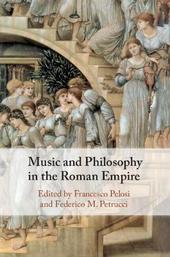
|
Music and Philosophy in the Roman Empire
Paperback / softback
Main Details
| Title |
Music and Philosophy in the Roman Empire
|
| Authors and Contributors |
Edited by Francesco Pelosi
|
|
Edited by Federico M. Petrucci
|
| Physical Properties |
| Format:Paperback / softback | | Pages:367 | | Dimensions(mm): Height 229,Width 152 |
|
| Category/Genre | Ancient and classical art BCE to c 500 CE
Music
Western philosophy - Ancient to c 500 |
|---|
| ISBN/Barcode |
9781108940955
|
| Classifications | Dewey:781.170937 |
|---|
| Audience | | Professional & Vocational | |
|---|
| Illustrations |
Worked examples or Exercises; Worked examples or Exercises
|
|
Publishing Details |
| Publisher |
Cambridge University Press
|
| Imprint |
Cambridge University Press
|
| Publication Date |
10 March 2022 |
| Publication Country |
United Kingdom
|
Description
Is music just matter of hearing and producing notes? And is it of interest just to musicians? By exploring different authors and philosophical trends of the Roman Empire, from Philo of Alexandria to Alexander of Aphrodisias, from the rebirth of Platonism with Plutarch to the last Neoplatonists, this book sheds light on different ways in which music and musical notions were made a crucial part of philosophical discourse. Far from being mere metaphors, notions such as harmony, concord and attunement became key philosophical tools in order to better grasp and conceptualise fundamental notions in philosophical debates from cosmology to ethics and from epistemology to theology. The volume is written by a distinguished international team of contributors.
Author Biography
Francesco Pelosi is Lecturer of History of Ancient Philosophy at the University of Pisa. His main field of study concerns the interaction between music and philosophy in ancient Greece, with a special focus on the mind-body relationship and theories of perception. He is the author of Plato on Music, Soul and Body (Cambridge, 2010). Federico M. Petrucci is Professor of History of Ancient Philosophy at the University of Turin. His main research areas are Plato and the Platonist Tradition and his publications include the first English translation of the texts of the Platonist Taurus of Beirut (2018).
Reviews'the collection is welcome and will serve as an excellent entry point to important thought about music linked directly to the antique roots of modern philosophy. Because there are no musical examples and the references to classical languages are translated into idiomatic English, laypersons - even those unfamiliar with the classical period - should not meet obstacles or have accessibility problems. Readers, whether in classics or in music, will find these essays invaluable for making inroads into a period long overlooked in music history. Highly recommended.' M. Dineen, Choice Connect
|